
28 minute read
Seeing Opportunity Where Others See Misfortune
Seeing Opportunity
Where Others See Misfortune
At 17, I immigrated from Peru. It was 2002, and I was filled with dreams and expectations for the great future I was determined to create in America. My father raised me to believe that with a degree from the greatest nation in the world, I would have doors open to me.
All I needed to do was study and work hard, and I would be on my way to build my American dream. I attended college for International Business and chose Chinese as my elective foreign language. I wanted to challenge myself and Chinese is really difficult. Exposing myself to the language and culture when I studied abroad in Shanghai for 10 weeks opened a wide variety of opportunities. I received a paid internship from a high tech company that was not part of the study abroad program.
All I had to do was walk into the President’s office and introduce myself with my language skills. But mainly it was my obsessive desire to make the best out of my opportunity of being in China. This included the four summer crash courses I was already taking at the time. After my experience in China, I understood that opportunities are everywhere, and that we have to be bold and have an open mind to see them when they show up.
During my time in college, I met my first husband with whom we made a great team helping each other get through college without debt. We both worked full-time at a bank call center from 5 a.m. to 1 p.m., which left time to study full-time after those hours.
In 2005, real estate was booming, so we decided to take a leap of faith and buy our first home. Prices were skyrocketing. Six months later, we decided to buy our second home and keep the first one as a rental. I By Rocio Vivanco
became a landlord at the age of 22.
But there were more challenges ahead. When the worst recession since the Great Depression hit in 2008, we lost the houses in foreclosure. The $30,000 in down payments that we still owed our parents was gone, along with the opportunity of being homeowners and landlords.
At the China Wall
Rocio age 8
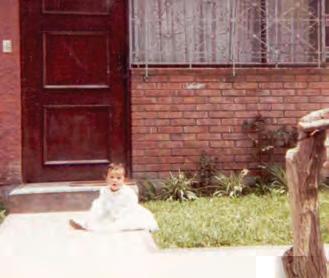
I graduated right after the recession in 2010 and the consequences were still hitting hard. A week into my new position at a new company, the company downsized several departments. I could not believe what I saw happening to the greatest nation. I prayed every day that I did not lose my new job. I also prayed for the wisdom to understand what I could have done differently to minimize my losses.
In the meanwhile, I was clinging to my American dream—the one I had left my dear family, friends and hometown to chase. My prayer was answered in the form of a book, “Rich Dad Poor Dad.” The book not only revolutionized my way of thinking, but contradicted what my loving parents had taught me. My parents always said get a degree, work hard and you will succeed. This probably worked in their generation. But in my generation, following that recipe did not guarantee a good job or a good income, especially not in my American dream. The book taught me about the power of cash flow and leveraging my time. I was mesmerized by its lessons and I was ready to take action.
But my husband was not. He was paralyzed with everything that we had experienced and the new challenge of keeping our jobs. I do not blame him. Starting again is never easy, but if you do, it is always rewarding.
In 2011, my husband met someone who changed his life and we divorced shortly thereafter. My world was upside down. Some of you might have experienced that time when your biological clock starts ticking. Mine involved my dream of becoming a mother. I learned that everything in our lives happen for a reason and for a greater purpose.
This painful experience taught me the power of faith. Through my spiritual journey, I healed and began looking forward to finding my better half—a person who shared my faith and purpose in life. In the meantime, while my maternity intuition was at its best, I decided to channel that love and desire into fostering children. I fostered for two years and I would not trade the parenting lessons I learned for anything in the world.
In 2012, real estate was booming again at a much stable pace. I decided it was time to pursue what “Rich Dad,
Poor Dad” had awakened inside of me. I bought my first home four months after my divorce. Then, I bought my first rental property. After that, I flipped my first property without even knowing what flipping a house meant.
I do not think the flipping TV shows even existed back then. I was determined, and although my rehab budgets were a joke compared to today, I started cleaning, painting and sanding with my partner in crime, the one who has supported me since the beginning, my mother. My investments were thriving. I was in alignment with my purpose in life. Even though my path has never been easy, doors were opening up, which made the challenges small compared to the opportunities.
In the process of becoming a diversified investor in a male-dominated industry, you will find challenges, such as dealing with contractors who try to take advantage of your naivety and kindness. I have been in situations where I have had to place a restraining order on someone or take people to mediation, etc. This is an industry where greed comes in many forms. You need to rely on your intuition and core values.
By 2016, I owned several rental properties, a multi-family unit and was flipping properties. I was ready to fire my boss. The news was shocking at my company since I was a dedicated worker. But I could not run my business and work full-time simultaneously. My decision was a big leap of faith because I was the only source of income supporting my business. I remember shaking in my boots while taking my resignation letter to my boss and having second thoughts. Several people questioned my decision.
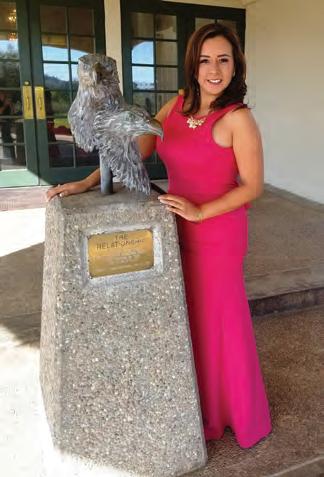
Indy house flip
Rocio and business partner First house flip
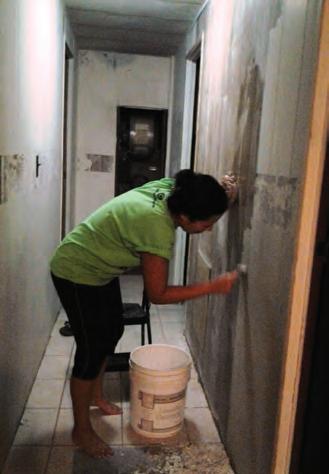
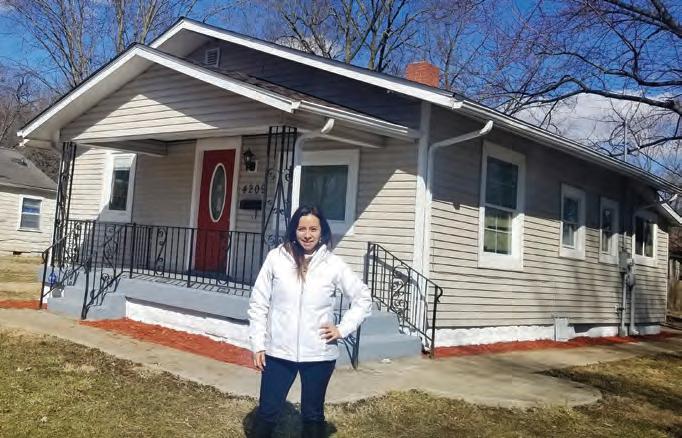
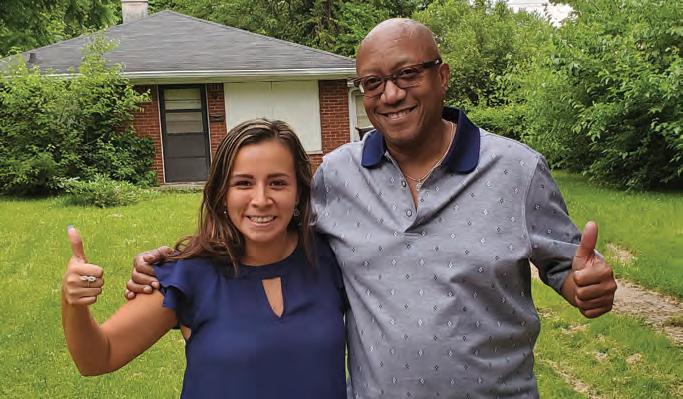
In the end, you must follow your intuition. As women, that has to be a very powerful one. Do not lose the opportunity to see the power of what lies within you.
The years of 2017 and 2018 were great for my new career, which proved I could not have chosen a better path. I was making money while sleeping and on vacation. This is the power of cash flow. But I deeply desired to meet the love of my life. I was single for so many years and I was ready to create a beautiful family.
I entered into a marathon of prayer, and in due time, I met him on May 18, 2018. He was exactly how I had visualized him. He was from a big city. He had a career. He was faithful. The phrase, “Good things come to those who wait” applies in my life. The wait, which at many times felt like an eternity, was finally paying off. Exactly one year later, we were married. Today, we are expecting a baby girl we will name Victoria. We chose that name because Victoria represents the many victories I have had in my life. I do not believe in downfalls or misfortunes, I only believe in opportunities. You can choose to play the victim or be creative, optimistic and resilient. That choice will shape your future.
COVID-19 has brought many challenges. The questions I have for you is, “Are you using this time to recreate your life and reshape your future? Or are you lamenting in your losses or trials?” This misfortune is another opportunity is disguise. Those who are capable of seeing it are the ones who will thrive and benefit from it the most. I sincerely wish you the very best. You deserve a great future. The best news is that it is already in your hands.
With deep love, Rocio.
More from Rocio
Email: rocio@wasire.com Website: wasire.com Linkedln: Rocio Vivanco Van Korlaar For direct Airbnb reservations: wasireairbnb@gmail.com “The Wild Wild West Las Vegas Home” airbnb.com/rooms/43002093?s=67&unique_share_id=921c06f7-ede The “Other Las Vegas Home” airbnb.com/rooms/43001265?s=67&unique_share_id=629e1384-193
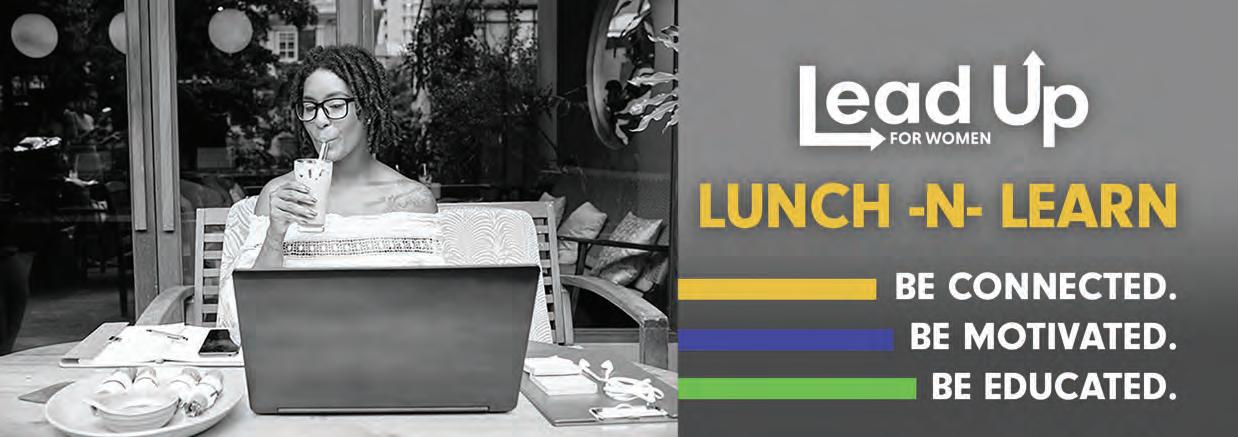
Starting September 3rd, 2020, every month on the 1st Thursday, Lead Up for Women and Partnering Member Sponsors will continue to support our mission to Unite Women of all Cultures, Race, and Diversity in realizing their greatest potential by inspiring each other to lean in to their best self and lead up from everywhere, then in turn, inspire others to do the same. We call it Lunch-N-Learn!
We invite you to grab your lunch, 90 minutes of your time, and be educated, motivated, and inspired by our Founder, Colleen Biggs, as well as spend time purposefully connecting with the other attendees. This is your opportunity to expand your circle, learn about additional resources to expand your knowledge, and Show Up to Lead Up in your personal life, your community, and your business/career! Remember, if learning is beneath you, then leadership is beyond you. Come join us!
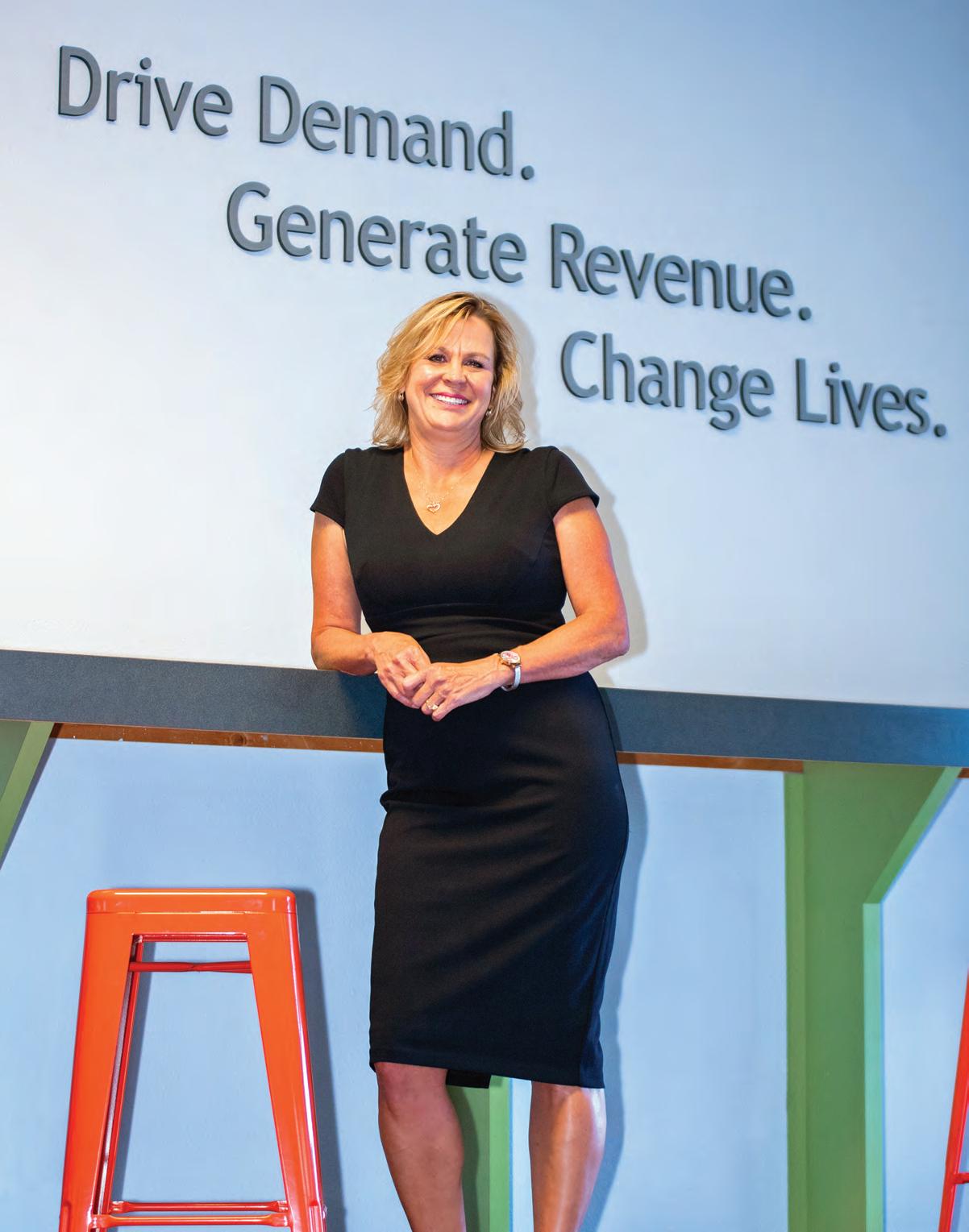
Fighting the good fight How Michelle Cirocco’s journey from prison to the C-Suite of Televerde is an inspiration to incarcerated women seeking a new start
Michelle Cirocco is not the kind of success story you are used to hearing.
And to be honest, that is just the way she likes it. Sentenced to prison based on some poor decisions she made, Michelle had the option to take one of two roads: Live in the misery of her decisions and situation, or find a better way forward. Choosing the second option is why her story is one with hearing.
Today, as the Chief Social Responsibility Officer of Televerde and Executive Director of the Televerde Foundation, Michelle’s life work—the passion she lives for—is to help other incarcerated women take the same steps she did. A fighter from the word go, Michelle has spent every day since she was released from prison and joined Televerde in 2002 working her way up the corporate ladder—starting in sales, and eventually spearheading its marketing efforts before taking on her new roles.
We sat down with her to get her thoughts on why second chances are so important and how each of us can make a difference in the lives of others.
Give us a snapshot of Televerde?
As the Chief Social Responsibility Officer of Televerde and Executive Director of the Televerde Foundation, my passion is empowering incarcerated women. I have a personal connection to this community. I know the devastating impact of having people and businesses want to define you by your worst mistake.
From my perspective, the more we can develop these women, the greater their ability to leave their criminal record where it belongs—in the past. The mission of the foundation is to help currently and formerly incarcerated women successfully join the global workforce. To do this, we provide training, education, and personal and professional development programs that enable them to develop the skills necessary for meaningful and rewarding careers and successful community reintegration.
Tell us what makes Televerde so unique?
We are the first and only fully integrated sales and marketing technology organization with a proven execution model for generating demand and accelerating sales. The company combines end-to-end sales and marketing solutions to drive engagement, pipeline and revenue for the world’s leading B2B companies, including SAP, Adobe-Marketo and Pulse Secure.
Since it began in 1995, Televerde has generated $8 billion in revenue for its clients. You may not find any of that unique, but we’re a purpose-built company. Televerde believes in second chance employment and strives to help disempowered people find their voice and reach their human potential. Seven of our 10 engagement centers are staffed by incarcerated women, representing 70% of the company’s 600-plus global workforce.
In 2005, Televerde’s visionary and former CEO Jim Hooker realized that improving the employability of incarcerated women was only half the battle. As they are released, they need jobs. And since Televerde could not hire them all, he wanted to ensure they were completely prepared to transition back into the community. That was the beginning of the TOPs (Televerde’s Out Placement Support) workshops, which were designed to prepare women for reentry and employment.
In 2020, the Televerde Foundation was launched to expand on this program, and design and deliver a robust workforce development program that focuses on personal wellness, workplace readiness, employment strategies, financial literacy, lifelong learning and mentoring.
Who are you targeting?
Televerde’s role in business is to generate leads, grow client pipelines and accelerate sales across all industries. Our core industries include manufacturing, software, telecommunications, consumer products, staffing and waste management.
Why do you do what you do?
I’ve always said that I have the best job in the world. I’ve seen first-hand the outcomes we can produce when we match Televerde’s best-of-breed model with corporations, governments and other entities that want to change the norm,
and couple that with the personal and professional development services of the Televerde Foundation.
Most important, I’ve seen how people’s lives have been changed because this company invested in them and gave them a second chance. I’m proof of it. When you witness this for yourself, and when you’re the beneficiary of it, it becomes incredibly important to do all you can to help change the trajectory of even more lives.
What hurdles have you overcome being a woman in business?
Does a prison sentence count as a hurdle? Here’s my story: With a deep desire for upward mobility and what I call “a misguided sense of entrepreneurialism,” I led myself down a path of making some poor decisions, which ultimately led me to prison. When I got there, my counselor said to me, “I’m sure you didn’t grow up expecting to go to prison, but here you are. What are you going to do about it?”
I decided I was going to use it as an opportunity to change the trajectory of my life, and I did. This is when started my career with Televerde in an entry level sales position. That was in 2002 after I was released. I was hired at their corporate office and I started my climb up the corporate ladder. I started in sales, then I ran sales for a while. I helped restructure the company and created our Client Success department. I ran that for seven years and then was promoted to Chief Marketing Officer in 2017. Now I’m Televerde’s Chief Social Responsibility Officer. Earlier this year, I was appointed Executive Director of the Televerde Foundation.
What do you do to give back?
Right now I’m building a non-profit. Televerde and the Televerde Foundation work hand in hand. Since Televerde’s inception, 3,000 women have graduated from the Televerde program. The threeyear reconviction (recidivism) rate for our graduates is 5.4%. (This is 91% lower than the national three-year recidivism rate.) In 2020, Arizona State University’s Seidman Research Institute unveiled the economic, social and fiscal impact of our prison workforce development program on individuals, families and the state of Arizona.
The results reveal that graduates of Televerde’s program go on to attain employment, earnings, and education at higher rates and reoffend at significantly lower rates than other formerly incarcerated females in the United States. Graduates are two times more likely to be in gainful employment post-release.
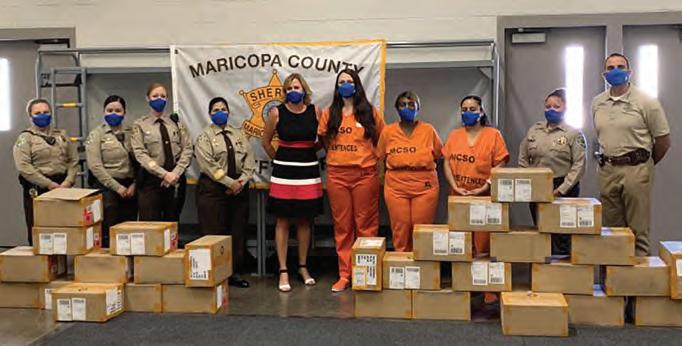
And 94% of graduates are in paid employment five years after incarceration, compared to 49% of other formerly incarcerated women. Graduates earn almost four times the national average for formerly incarcerated females. Graduates return to society with an average of $10,000 in savings to help with reentry costs (clothing, secure housing and pay for transportation post-release).
Despite similar levels at the time of incarceration, graduates attain higher levels of education with 84% having some college and 30% earning advanced degrees. Dependent children are 11 times more likely to graduate high school than dependent children of other incarcerated mothers. Adult children are 11 times less likely to be incarcerated compared to the adult children of other incarcerated mothers.
What do you see as some of your biggest opportunities moving ahead?
My goal is to help rapidly grow our company and foundation so we can expand what we know is a proven methodology to different geographies and other groups that need support and opportunity. Our BHAG is to provide 10,000 life-changing opportunities over the next decade and expand to help more disempowered populations.
What is your method to staying connected with other women in business?
I’m constantly networking. I love to meet and learn from new people. I try to attend as many events as possible to spread the Televerde story and share the Televerde Foundation.
What mentors, sponsors or coaches have played an important role in your success?
My greatest mentor was Televerde’s co-founder and former CEO Jim Hooker. Jim wholeheartedly believed “the human spirit under the right conditions and given the right opportunity could rise up and achieve extraordinary things.”
Because of his unwavering commitment to the growth of Televerde and continued investments in society’s most vulnerable, I’ve had the privilege of seeing more than 3,000 women transform
their lives and rejoin society to become successful leaders, caregivers and business professionals. As a beneficiary of Jim’s vision, I am honored and inspired by the opportunity to continue his work.
How do you stay current with today’s trends?
I’ll be honest, negative news cycles really hinder my ability to stay positive and move forward. I prefer to stay current with trends on LinkedIn. I always ensure that I connect on LinkedIn with the incredible people I meet at events or through my work, so it’s easy for me to quickly see what other thought leaders are saying. But beyond connecting with people and liking posts, I actually click-through and read things thoroughly. Then, when I find something new or interesting, I dig a little deeper, learn more and figure out how to use the information effectively.
What is your growth plan?
I’ve always said I’m not interested in leading a foundation to teach classes to a few hundred women. Did you know that there are 81,000 women released from prison each year in the US? That number inspires me to do more. My growth plan for the Televerde Foundation is to continue to expand and provide relevant career programming for women across the country and beyond. In order to do that, we need the support and partnerships of like-minded companies to ensure funding and development opportunities to build prison to workforce pipelines that help our partners reach their goals while supporting the mission of the foundation.
What’s the biggest item on your to-do list right now?
Significantly raising awareness for the foundation itself, the problem we seek to solve, and identifying the organizations and partnerships that will help us provide these solutions.
What’s the most rewarding part of your career?
Every day I have the opportunity to witness women successfully transition back into the community. They reunite with their families and their children, start professional careers, graduate from college, buy houses, and achieve things
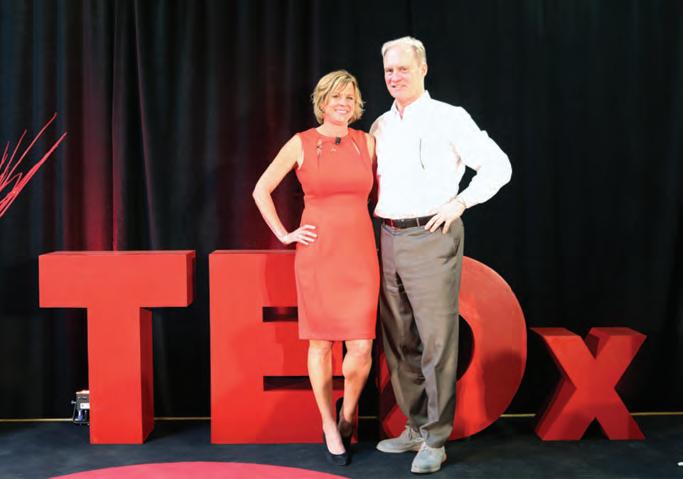
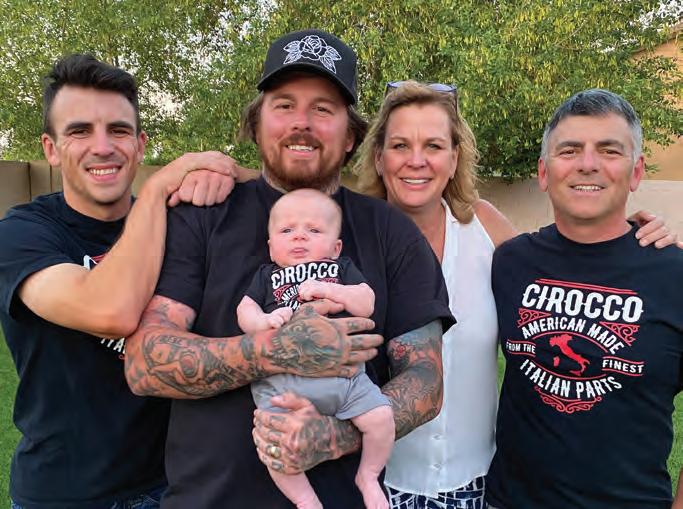
they once believed impossible. It simply a gift to be able to witness their dreams come true.
Describe a typical day.
I get up every morning at 5 a.m. and have coffee with my husband, Chris. I check my schedule for the day, do my devotional, workout and walk my dogs. I’m at my desk by 9 a.m., where half of my day is filled with Zoom calls. These are typically focused on how we’re building out the foundation, raising awareness for our cause or speaking engagements for my other position as Chief Social Responsibility officer of Televerde. The other half of the day, when I’m not on calls, is spent working on the business. What are we building? Where are we going? What are the goals? What am I pursuing next? I’m constantly looking forward for positive impact.
I wrap up the day enjoying a cocktail with my husband, usually my favorite, a fresh grapefruit martini. And one more Zoom call, this time with my new grandson. Chris is a great chef, so we typically have an amazing homemade dinner. If it’s summer, we’re in the pool. In the winter, we sit by the fire for the rest of the evening.
What is your secret to success?
Learn, work hard, set goals, ask for help—and this is important—don’t be afraid to say what you want. I am a firm believer in this idea from the Alchemist, “When you want something bad enough, the universe will conspire to make it happen.”
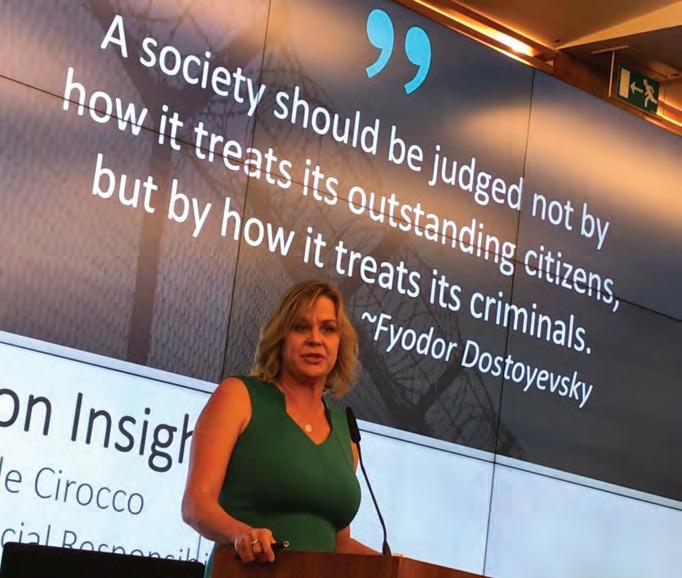
One-on-One with...
Michelle Cirocco
Tell us about your family?
My family is full of men who have stolen my heart. I live in Arizona with Chris. Together, we have two amazing sons and two incredible daughters-in-law. I just became a Mimi to my first grandson. It’s the best.
What motivates you every day?
We’ve come a long way in changing the societal stigmas associated with the formerly incarcerated, but there’s still much work to be done. The narrative that’s widely accepted today is that US prisons are reserved for the worst that society has to offer and that those who are incarcerated are unsalvageable. This is a myth. About one-third of Americans today have a criminal record so the reality is they have to be salvageable.
Finding empathy and providing a path forward for individuals with a criminal record will not only help them personally, but strengthen families, communities, businesses and economies. Because this group I support is so stigmatized, I realize that if I don’t do this important work, many of them will be left behind. It’s what gets me out of bed each morning.
How do you prioritize your health, family and career?
I try to prioritize in exactly that order. If you had asked me this question just a few years ago, my career would have been first. But I have a renewed focus on my health and family. After my former boss had a massive stroke, I realized and recognized that I didn’t want to end my life having given everything to my career and missing out on the most important things, so I adjusted my priorities. We make time for what’s most important, so if you recognize that health and family are the most important, it’s much easier to put them above all else.
How do you tap into the power of YOU that makes you unique? And how has that pushed you forward?
This seems like such a simple question, but it isn’t. It’s very easy to define ourselves and our stories by our careers, but we are so much more than that. I think women generally have a difficult time defining who we are outside of our careers and our children. It is very easy to define ourselves as a mother, a wife, an executive, etc. But the challenge comes when we look beyond these roles. We give so much time to everything else that we often lose sight of who we are inside.
I am all of these things: a mother, a wife, a new grandmother, a daughter, an executive at a sales and marketing company, the executive director of a non-profit. But I am also a convicted felon. I’m a woman who through my own actions made a huge mess of my life, then faced the consequences head-on. It is through this experience that I define who I am today.
I am a woman who is capable of anything I set my mind to. I am a highly motivated learner who is driven to achieve my “next big thing,” no matter what it is. I am passionate about learning, creating new experiences, and enabling others to recognize their value and seize opportunities to achieve more than they ever thought possible.
Who inspires you?
I am inspired everyday by the Televerde women who are pursuing and achieving their dreams. Every day, I witness women successfully transition back into their communities. They reunite with their families and their children, start professional careers, graduate from college, buy houses, and achieve things they once believed impossible. It is simply a gift to be able to witness their dreams come true.
What inspires you?
I’m inspired by the future, by having an idea and seeing it come to life and making it happen. This is true in my personal life as well as my professional life. I love to think about a vacation, and turn it into an experience or seeing a business idea come to life and help others.
What’s the best thing a consumer/client ever said to you?
I have a few of these, but if I must choose just one, it’s likely when Brian Mohr, then president of the Arizona Chapter of Conscious Capitalism, was visiting our Engagement Centers at Perryville Correctional. He was having a roundtable with the women he met, and he told them how there was absolutely no difference between them and him, other than a bit of luck. That they were there, in prison, for many of the same things he did in his own life during college and beyond. No one had ever been that candid or truthful before during a professional visit, so it was a powerful statement for all of us.
What are your strongest traits as a leader?
This is a tough one. I think my strongest leadership traits are being authentic and vulnerable. I make mistakes. I am afraid. I don’t always know what I’m doing. And I’m alright with saying those things. By being authentic and honest, people can connect with me on a more human level. Leaders who inspire me are visionaries—those who have a long-term strategic vision and who can articulate that vision in a way that inspires action.
How are you mentoring/sponsoring others?
I make myself available to the women I work with. I have an open door/open email policy. I give them my time, answer questions, share experiences, etc. Through the foundation, we are constantly bringing educational opportunities and experiences to our incarcerated women. Our goal is to give them access to anything that will help them learn and advance.
What are you reading now?
Fiction books for me are indulgent and I save them for summer. I’m about to finish up “An American Marriage” by Tayari Jones. Next up is “Where the Crawdads Sing.”
What are your favorite hobbies?
I love anything outdoors. The weather dictates my hobbies, but I enjoy scuba, snorkeling, skiing, golfing and hiking. My favorite indoor hobby is designing craft cocktails.
How do you like to spend your down time?
See above. After my hobbies, I’m usually in my backyard, by the pool, enjoying something delicious from my pizza oven.
What was the best advice you ever received?
Two things that changed my life: When I arrived in prison, my counselor said to me, “I’m sure you didn’t grow up expecting to go to prison, but here you are. What are you going to do about it?” He urged me to use my time to make me better and to make a difference. It was that moment that led me to Televerde and my strong will to better myself.
The second thing came from my former boss and mentor, Jim Hooker, who told me, “Education is like exercise for the mind, the more you do, the greater your perspective of the world.” This is how I became a lifelong learner.
What does “Lead Up” mean to you?
My mom always said, “If you have enough, then you have enough to share.” Lead Up seems like that to me. Almost like paying it forward. I feel blessed every day that I wake up living this life, amazed by my second chance and the incredible life I now have. Everything that I have is mine to give, and I feel obligated to give away as much as I can to as many people as I can. It’s how I grow and do better, and help others do the same.
Make the Impossible Possible How Sandra Hill continues to be the guide in life’s great journey
Refocus and Gain Clarity
Do you have a sense of purpose? Are you living your passion? I am now. I wasn’t for a long time. I did not realize it though. I did realize that something was missing; I just could not put my finger on it.
Did I go around “seeking” to find what was missing? No. What was missing actually came into focus one day. But it was not until I “refocused” and “gained clarity” that I began to live my passion. Yes, there were times I felt frustrated, but that feeling diminished once I discovered my sense of purpose. And you know what? You can, too.
We all get frustrated. But I found that each person deals with their frustration differently. Re-focusing your frustration is a great way to take negative energy and turn it into positive. In other words, rather than doing or saying something you might regret later, choose to have a more positive impact on your actions. If you do not control your frustration, it tends to lead to anger.
How do you refocus?
First, you must be able to recognize you are feeling or getting frustrated. Try to calm yourself by breathing slower. (Some find that closing their eyes and counting to 10 backwards helps.)
The second step is to ask yourself certain questions that are designed to help you understand yourself and become more aware of possible triggers. Possible questions might include: 1. What is the desired outcome of the conversation or situation? 2. If I were to visualize the outcome, would it be a positive one? › If not, what needs to change? What needs to happen? › If t he action is a positive one, what actions do you need to take to ensure that the situation or conversation remains positive? 3. If the conversation is what is frustrating, do you need to adjust your tone? 4. If the situation is what is frustrating, do you need to adjust your actions? 5. If the time, place or person you are speaking to is not ideal, you have the power to change it, so how can you do so?
Finally, when you speak again, remain calm and positive. If you are able to do so, interject humor. Be sure to positively express your frustration and share what needs to change or what your “hot button” might be. Try to schedule a “better” time or different location to have the conversation or work through the situation.
Now, to gain clarity, try this exercise:
List all the things you are not clear about. Review each of them by asking these questions:
› Is it important for me to gain clarity on this issue? If the answer is yes, jot down at least three things you can do to fix the situation. › Pr ioritize the list, but only work to resolve the first item. › Decide how much time you will need, and calendar it or schedule like you would a doctor’s appointment
You must focus and gain the needed clarity to act because every action you take is an opportunity for you to make an impact—on yourself, your family, the lives of others and your community as a whole.

Meet Sandra Hill
Author. Speaker. Trainer. Radio show host. Life, business and career coach. So how did Sandra Hill get to this chapter in her life? That, she says, may be the makings of a “yet-to-be-written” autobiography. It has been quite a ride. The daughter of a career military officer father, Sandra considers herself a world-traveler, moving almost every year until her teens. Along with English, she speaks French, German and Latin.
After getting married and raising a family, she found herself in the unique position of being a coach, not only helping her family, but being the one people recommended talking to. After 36 years of civil service and more than 20 years of studying business and coaching books, she sought formal training and certification.
Post retirement, she decided to become an entrepreneur, and founded New Horizen Coaching & Professional Growth Advancement, serving as a mentor to those committed to advancing their careers. Her company’s motto is “Make the Impossible Possible.” She also volunteers with several non-profit organizations, including Habitat for Humanity, Special Olympics and Open Hand.
For more information or to reach out to Sandra, vistit newhorizencoaching.com.







